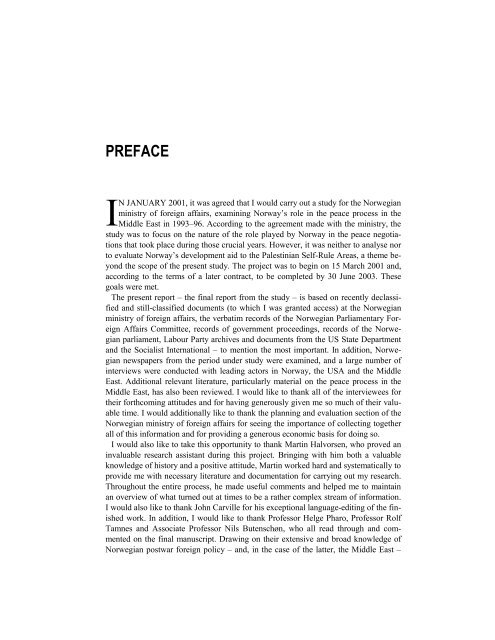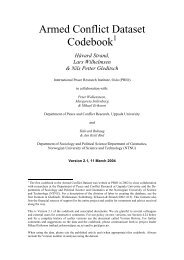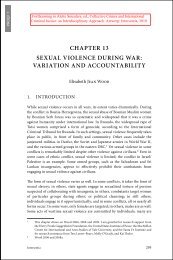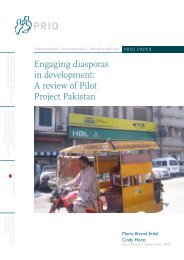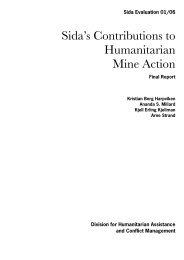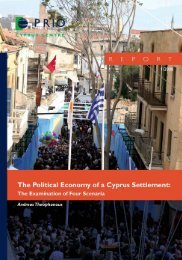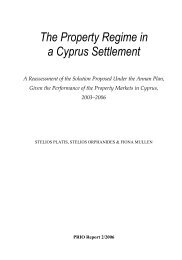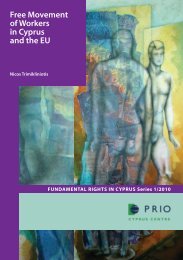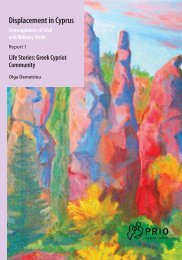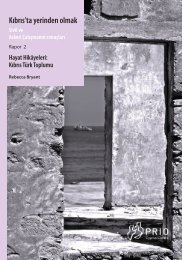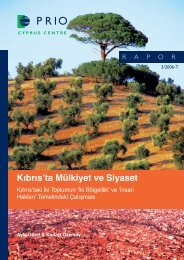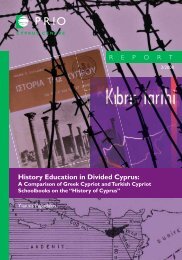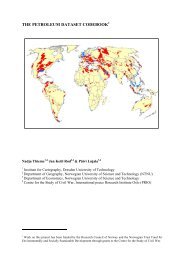- Page 4: Institutt for fredsforskningInterna
- Page 10 and 11: 2 ‘Peacemaking Is a Risky Busines
- Page 12 and 13: 4 ‘Peacemaking Is a Risky Busines
- Page 14 and 15: 6 ‘Peacemaking Is a Risky Busines
- Page 16 and 17: 8 ‘Peacemaking Is a Risky Busines
- Page 18 and 19: 10 ‘Peacemaking Is a Risky Busine
- Page 21 and 22: Chapter 1THE ROAD TO OSLOIDEALLY, M
- Page 23 and 24: The Road to Oslo15Palestinians real
- Page 25 and 26: The Road to Oslo17new Israeli gover
- Page 27 and 28: The Road to Oslo19than ever. The Re
- Page 29 and 30: The Road to Oslo21acceptance of the
- Page 31 and 32: The Road to Oslo23After 1945, the i
- Page 33 and 34: The Road to Oslo25headway. The new
- Page 35 and 36: The Road to Oslo27The Madrid Confer
- Page 37: The Road to Oslo29cial framework of
- Page 40 and 41: 32 ‘Peacemaking Is a Risky Busine
- Page 42 and 43: 34 ‘Peacemaking Is a Risky Busine
- Page 44 and 45: 36 ‘Peacemaking Is a Risky Busine
- Page 46 and 47: 38 ‘Peacemaking Is a Risky Busine
- Page 48 and 49: 40 ‘Peacemaking Is a Risky Busine
- Page 50 and 51: 42 ‘Peacemaking Is a Risky Busine
- Page 52 and 53: 44 ‘Peacemaking Is a Risky Busine
- Page 54 and 55: 46 ‘Peacemaking Is a Risky Busine
- Page 56 and 57:
48 ‘Peacemaking Is a Risky Busine
- Page 59 and 60:
Chapter 3THE MODEST FACILITATOR‘T
- Page 61 and 62:
The Modest Facilitator53state. The
- Page 63 and 64:
The Modest Facilitator55overcome. F
- Page 65 and 66:
The Modest Facilitator57accident. I
- Page 67 and 68:
The Modest Facilitator59The Oslo op
- Page 69 and 70:
The Modest Facilitator61underground
- Page 71 and 72:
The Modest Facilitator63kinds of st
- Page 73 and 74:
The Modest Facilitator65and I will
- Page 75 and 76:
The Modest Facilitator67ister Rabin
- Page 77 and 78:
The Modest Facilitator69had been -
- Page 79 and 80:
The Modest Facilitator71Rød Larsen
- Page 81 and 82:
The Modest Facilitator7379 and in W
- Page 83 and 84:
The Modest Facilitator75such an app
- Page 85 and 86:
The Modest Facilitator77be accused
- Page 87 and 88:
The Modest Facilitator79former US s
- Page 89 and 90:
The Modest Facilitator81providing c
- Page 91 and 92:
The Modest Facilitator83the importa
- Page 93 and 94:
Chapter 4THE ACTIVE MEDIATORAFTER F
- Page 95 and 96:
The Active Mediator87retary in the
- Page 97 and 98:
The Active Mediator89of the session
- Page 99 and 100:
The Active Mediator91But Rabin was
- Page 101 and 102:
The Active Mediator93They agreed to
- Page 103 and 104:
The Active Mediator95come first. At
- Page 105 and 106:
The Active Mediator97Singer taking
- Page 107 and 108:
The Active Mediator99A frustrated A
- Page 109 and 110:
The Active Mediator101However, the
- Page 111 and 112:
The Active Mediator103the second ph
- Page 113 and 114:
The Active Mediator105areas. In fac
- Page 115 and 116:
The Active Mediator107ings and emot
- Page 117 and 118:
The Active Mediator109DoP. For the
- Page 119 and 120:
The Active Mediator111Peres had pre
- Page 121 and 122:
The Active Mediator113legitimacy fo
- Page 123 and 124:
The Active Mediator115In Israel, R
- Page 125 and 126:
The Active Mediator117Washington. 1
- Page 127 and 128:
The Active Mediator119the changed I
- Page 129 and 130:
The Active Mediator121an extra trip
- Page 131 and 132:
The Active Mediator123Palestinians
- Page 133 and 134:
The Active Mediator125The points of
- Page 135 and 136:
The Active Mediator127point of view
- Page 137 and 138:
The Active Mediator129Peres knew th
- Page 139 and 140:
The Active Mediator131all Israelis
- Page 141 and 142:
The Active Mediator133asleep, but w
- Page 143 and 144:
The Active Mediator135Three major i
- Page 145 and 146:
The Active Mediator137ment would be
- Page 147 and 148:
The Active Mediator139ting guarante
- Page 149 and 150:
The Active Mediator141Informing the
- Page 151 and 152:
The Active Mediator143was willing t
- Page 153 and 154:
The Active Mediator145At the meetin
- Page 155 and 156:
The Active Mediator147demanded that
- Page 157:
The Active Mediator149There were tw
- Page 160 and 161:
152 ‘Peacemaking Is a Risky Busin
- Page 162 and 163:
154 ‘Peacemaking Is a Risky Busin
- Page 164 and 165:
156 ‘Peacemaking Is a Risky Busin
- Page 166 and 167:
158 ‘Peacemaking Is a Risky Busin
- Page 168 and 169:
160 ‘Peacemaking Is a Risky Busin
- Page 170 and 171:
162 ‘Peacemaking Is a Risky Busin
- Page 172 and 173:
164 ‘Peacemaking Is a Risky Busin
- Page 174 and 175:
166 ‘Peacemaking Is a Risky Busin
- Page 176 and 177:
168 ‘Peacemaking Is a Risky Busin
- Page 178 and 179:
170 ‘Peacemaking Is a Risky Busin
- Page 180 and 181:
172 ‘Peacemaking Is a Risky Busin
- Page 182 and 183:
174 ‘Peacemaking Is a Risky Busin
- Page 184 and 185:
176 ‘Peacemaking Is a Risky Busin
- Page 186 and 187:
178 ‘Peacemaking Is a Risky Busin
- Page 188 and 189:
180 ‘Peacemaking Is a Risky Busin
- Page 190 and 191:
182 ‘Peacemaking Is a Risky Busin
- Page 192 and 193:
184 ‘Peacemaking Is a Risky Busin
- Page 194 and 195:
186 ‘Peacemaking Is a Risky Busin
- Page 196 and 197:
188 ‘Peacemaking Is a Risky Busin
- Page 198 and 199:
190 ‘Peacemaking Is a Risky Busin
- Page 200 and 201:
192 ‘Peacemaking Is a Risky Busin
- Page 202 and 203:
194 ‘Peacemaking Is a Risky Busin
- Page 204 and 205:
196 ‘Peacemaking Is a Risky Busin
- Page 206 and 207:
198 ‘Peacemaking Is a Risky Busin
- Page 208 and 209:
200 ‘Peacemaking Is a Risky Busin
- Page 210 and 211:
202 ‘Peacemaking Is a Risky Busin
- Page 212 and 213:
204 ‘Peacemaking Is a Risky Busin
- Page 214 and 215:
206 ‘Peacemaking Is a Risky Busin
- Page 216 and 217:
208 ‘Peacemaking Is a Risky Busin
- Page 218 and 219:
210 ‘Peacemaking Is a Risky Busin
- Page 220 and 221:
212 ‘Peacemaking Is a Risky Busin
- Page 222 and 223:
214 ‘Peacemaking Is a Risky Busin
- Page 224 and 225:
216 ‘Peacemaking Is a Risky Busin
- Page 226 and 227:
218 ‘Peacemaking Is a Risky Busin
- Page 228 and 229:
220 ‘Peacemaking Is a Risky Busin
- Page 230 and 231:
222 ‘Peacemaking Is a Risky Busin
- Page 232 and 233:
224 ‘Peacemaking Is a Risky Busin
- Page 234 and 235:
226 ‘Peacemaking Is a Risky Busin
- Page 236 and 237:
228 ‘Peacemaking Is a Risky Busin
- Page 238 and 239:
230 ‘Peacemaking Is a Risky Busin
- Page 240 and 241:
232 ‘Peacemaking Is a Risky Busin
- Page 242 and 243:
234 ‘Peacemaking Is a Risky Busin
- Page 244 and 245:
236 ‘Peacemaking Is a Risky Busin
- Page 246 and 247:
238 ‘Peacemaking Is a Risky Busin
- Page 248 and 249:
240 ‘Peacemaking Is a Risky Busin
- Page 250 and 251:
242 ‘Peacemaking Is a Risky Busin
- Page 252 and 253:
244 ‘Peacemaking Is a Risky Busin
- Page 254 and 255:
246 ‘Peacemaking Is a Risky Busin
- Page 256 and 257:
248 ‘Peacemaking Is a Risky Busin
- Page 258 and 259:
250 ‘Peacemaking Is a Risky Busin
- Page 260 and 261:
252 ‘Peacemaking Is a Risky Busin
- Page 262 and 263:
254 ‘Peacemaking Is a Risky Busin
- Page 264 and 265:
256 ‘Peacemaking Is a Risky Busin


